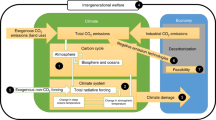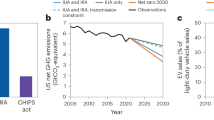Abstract
From carbon pricing to green industrial policy, economic ideas have shaped climate policy. Drawing on a new dataset of policy reports, we show how economic ideas influenced climate policy advice by major international organizations, including the Organisation for Economic Cooperation and Development and the World Bank, from 1990 to 2017. In the 1990s, the neoclassical notion of weak complementarity between environmental protection and growth dominated debates on sustainable development. In the mid-2000s, economic thought on the environment diversified, as the idea of strong complementarity between environmental protection and growth emerged in the green growth discourse. Adaptations of Schumpeterian and Keynesian economics identified investment in energy innovation and infrastructure as drivers of growth. We thus identify a major transformation from a neoclassical paradigm to a diversified policy discourse, suggesting that climate policy has entered a postparadigmatic period. The diversification of ideas broadened policy advice from market-based policy to green industrial policy, including deployment subsidies and regulation.
This is a preview of subscription content, access via your institution
Access options
Access Nature and 54 other Nature Portfolio journals
Get Nature+, our best-value online-access subscription
$29.99 / 30 days
cancel any time
Subscribe to this journal
Receive 12 print issues and online access
$209.00 per year
only $17.42 per issue
Buy this article
- Purchase on Springer Link
- Instant access to full article PDF
Prices may be subject to local taxes which are calculated during checkout
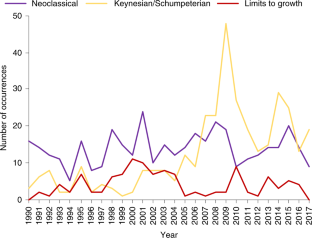

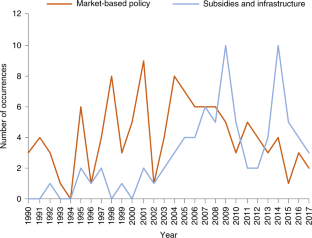
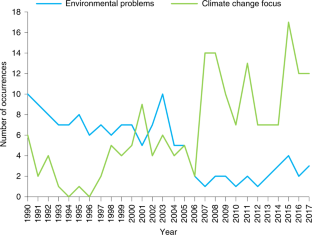
Similar content being viewed by others
Data availability
The data are available in the Supplementary Data. The source data for Figs. 1–4 are also available as supplementary files.
References
Bernstein, S. The Compromise of Liberal Environmentalism (Columbia Univ. Press, 2001).
Jacobs, M. in The Handbook of Global Climate and Environmental Policy (ed. Falkner, R.) 197–214 (John Wiley & Sons, 2013).
Tienhaara, K. Varieties of green capitalism: economy and environment in the wake of the global financial crisis. Environ. Polit. 23, 187–204 (2013).
Bäckstrand, K. & Lövbrand, E. The road to Paris: contending climate governance discourses in the post-Copenhagen era. J. Environ. Policy Plan. 21, 519–532 (2019).
Lövbrand, E. & Stripple, J. Making climate change governable: accounting for carbon as sinks, credits and personal budgets. Crit. Policy Stud. 5, 187–200 (2011).
Stripple, J. & Bulkeley, H. New Approaches to Rationality, Power and Politics (Cambridge Univ. Press, 2014).
Pearce, D., Markandya, A. & Barbier, E. B. Blueprint for a Green Economy (Earthscan, 1989).
Antal, M. & Karhunmaa, K. The German energy transition in the British, Finnish and Hungarian news media. Nat. Energy 3, 994–1001 (2018).
Thornberg, R. & Charmaz, K. in The Sage Handbook of Qualitative Content Analysis (ed. Flick, U.) 153–169 (Sage, 2014).
Schreier, M. in The Sage Handbook of Qualitative Content Analysis (ed. Flick, U.) 170–183 (Sage, 2014).
Bina, O. The green economy and sustainable development: an uneasy balance? Environ. Plan. C 31, 1023–1047 (2013).
Ferguson, P. The green economy agenda: business as usual or transformational discourse? Environ. Polit. 24, 17–37 (2014).
Death, C. Four discourses of the green economy in the global South. Third World Q. 36, 2207–2224 (2015).
Stevenson, H. Contemporary discourses of green political economy: a Q method analysis. J. Environ. Policy Plan. 21, 533–548 (2019).
Georgeson, L., Maslin, M. & Poessinouw, M. The global green economy: a review of concepts, definitions, measurement methodologies and their interactions. Geo 4, e00036 (2017).
Borel-Saladin, J. M. & Turok, I. N. The green economy: incremental change or transformation? Environ. Policy Gov. 23, 209–220 (2013).
Nordhaus, W. D. Resources as a constraint on growth. Am. Econ. Rev. 64, 22–26 (1974).
Hartwick, J. M. Intergenerational equity and the investing of rents from exhaustible resources. Am. Econ. Rev. 66, 253–256 (1977).
Solow, R. M. The economics of resources or theresources of conomics. Am. Econ. Rev. 64, 1–14 (1974).
1991 UNDP Annual Report: The Challenge of the Environment (UNDP, 1992).
Informal Meeting of the G7 Environment Ministers (G7, 1994).
The World Bank Annual Report 1995 (World Bank, 1995).
Hajer, M. A. The Politics of Environmental Discourse: Ecological Modernization and the Policy Process (Clarendon, 1995).
The Global Environmental Facility: A Self-Assessment (World Bank, 1996).
Newell, P. & Paterson, M. Climate Capitalism: Global Warming and the Transformation of the Global Economy (Cambridge Univ. Press, 2010).
Ciplet, D., Roberts, J. T. & Khan, M. R. Power in a Warming World (MIT Press, 2015).
World Bank World Development Report 1992: Development and the Environment (Oxford Univ. Press, 1992).
IPCC Climate Change 1995: Synthesis Report (eds Bolin, B. et al.) (Cambridge Univ. Press, 1996).
Michaelowa, A. & Michaelowa, K. Climate business for poverty reduction? The role of the World Bank. Rev. Int. Organ. 6, 259–286 (2011).
Skovgaard, J. EU climate policy after the crisis. Environ. Polit. 23, 1–17 (2013).
Gravey, V. & Jordan, A. Does the European Union have a reverse gear? Policy dismantling in a hyperconsensual polity. J. Eur. Public Policy 23, 1180–1198 (2016).
Stern, N. Lionel Robbins Memorial Lecture Series: How We Can Respond and Prosper: The New Energy–Industrial Revolution (LSE, 2012).
Acemoglu, D., Aghion, P., Bursztyn, L. & Hemous, D. The environment and directed technical change. Am. Econ. Rev. 102, 131–166 (2012).
Acemoglu, D., Akcigit, U., Hanley, D. & Kerr, W. Transition to clean technology. J. Polit. Econ. 124, 52–104 (2016).
Barbier, E. B. A Global Green New Deal: Rethinking the Economic Recovery (Cambridge Univ. Press, 2010).
Edenhofer, O. & Stern, N. Towards a Global Green Recovery (PIK and LSE, 2009).
Bowen, A. & Stern, N. Environmental policy and the economic downturn. Oxf. Rev. Econ. Policy 26, 137–163 (2010).
Annual Report 2006 (OECD, 2006).
Green Growth: Overcoming the Crisis and Beyond (OECD, 2009).
UNEP Climate Change Strategy (UNEP, 2009).
UNEP Annual Report 2011 (UNEP, 2012).
Secretary-General’s Report to Ministers 2016 (OECD, 2016).
G7 Environment Ministers Meeting Communiqué (G7, 2016).
Farrell, H. & Quiggin, J. Consensus, dissensus, and economic ideas: economic crisis and the rise and fall of Keynesianism. Int. Stud. Q. 61, 269–283 (2017).
A Global Green New Deal: Policy Brief (UNEP, 2009).
Barbier, E. B. Rethinking the Economic Recovery: A Global Green New Deal (UNEP, 2009).
Annual Report 2011/2012: The Sustainable Future We Want (UNDP, 2012).
Report of the Conference of the Parties on Its Seventeenth Session (UNFCCC, 2011).
Dimitrov, R. S. The Paris Agreement on climate change: behind closed doors. Glob. Environ. Polit. 16, 1–11 (2016).
Report of the Conference of the Parties on Its Twenty-First Session (UNFCCC, 2015).
Meadows, D. H., Meadows, D. L., Randers, J. & Behrens III, W. W. The Limits to Growth: A Report for the Club of Rome’s Project on the Predicament of Mankind (Universe Books, 1972).
Daly, H. E. The economics of the steady state. Am. Econ. Rev. 64, 15–21 (1974).
Policies to Promote Technologies for Cleaner Production and Products: Guide for Government Self-Assessment (OECD, 1995).
Annual Report 2001 (OECD, 2001).
Bernstein, S. in Encyclopedia of Global Environmental Governance and Politics (eds. Pattberg, P. H. and Zelli, F.) 45–52 (Edward Elgar Publishing, 2015).
Hale, T. Catalytic Cooperation Blavatnik School of Government Working Paper BSG-WP-2018/026 (Oxford Univ. Press, 2018).
Falkner, R. The Paris Agreement and the new logic of international climate politics. Int. Aff. 92, 1107–1125 (2016).
Hall, P. A. Policy paradigms, social learning, and the state: the case of economic policymaking in Britain. Comp. Polit. 25, 275–296 (1993).
Hogan, J. & Howlett, M. in Policy Paradigms in Theory and Practice: Discourses, Ideas and Anomalies in Public Policy Dynamics (eds Hogan, J. & Howlett, M.) 3–18 (Palgrave Macmillan, 2015).
Acknowledgements
We thank A. Agopian, M. Conner, R. Jacobson and Z. Woogen for research assistance. We thank S. Bernstein, M. Kocher and M. Paterson for excellent comments.
Author information
Authors and Affiliations
Contributions
Both authors contributed equally to all steps of the analysis and writing.
Corresponding author
Ethics declarations
Competing interests
The authors declare no competing interests.
Additional information
Peer review information Nature Climate Change thanks Miklos Antal, Angela Oels and the other, anonymous, reviewer(s) for their contribution to the peer review of this work.
Publisher’s note Springer Nature remains neutral with regard to jurisdictional claims in published maps and institutional affiliations.
Supplementary information
Supplementary Information
Supplementary Tables 1 and 2, Notes 1 and 2 and references.
Supplementary Data
Complete data as an Excel spreadsheet. The spreadsheet includes 8 worksheets: 1 for each of the 6 IOs, 1 that aggregates the data and 1 that organizes the data into clusters for the figures (per Supplementary Table 2). The figures are also reproduced in the last worksheet.
Source data
Source Data Fig. 1
Source data for Fig. 1.
Source Data Fig. 2
Source data for Fig. 2.
Source Data Fig. 3
Source data for Fig. 3.
Source Data Fig. 4
Source data for Fig. 4.
Rights and permissions
About this article
Cite this article
Meckling, J., Allan, B.B. The evolution of ideas in global climate policy. Nat. Clim. Chang. 10, 434–438 (2020). https://doi.org/10.1038/s41558-020-0739-7
Received:
Accepted:
Published:
Issue Date:
DOI: https://doi.org/10.1038/s41558-020-0739-7
This article is cited by
-
Most industrialised countries have peaked carbon dioxide emissions during economic crises through strengthened structural change
Communications Earth & Environment (2023)
-
The effect of carbon price on low carbon innovation
Scientific Reports (2023)
-
Political strategies for climate and environmental solutions
Nature Sustainability (2023)
-
A critical review of green growth indicators in G7 economies from 1990 to 2019
Sustainability Science (2023)
-
Comprehensive evaluation of sustainable consumption towards green growth based on an interval valued Neutrosophic TOPSIS approach
Environmental Science and Pollution Research (2023)


